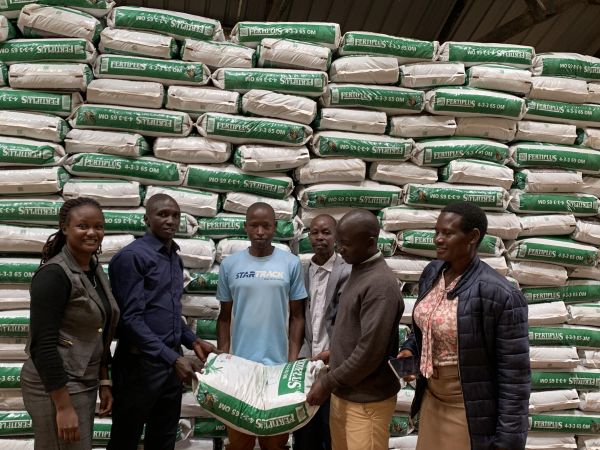KAPCHORWA, October 29, 2025 — More than 400 farmers in Kapchorwa district have received coffee fertilisers from the district production office as part of an ongoing effort to boost coffee productivity and improve household incomes.
The distribution exercise was held recently at the district offices and presided over by the District Production Officer, Filex Sabila, who reiterated the government’s commitment to strengthening the agricultural sector, particularly coffee, which remains a major cash crop in the Sebei Subregion.
“This initiative is part of our continuous efforts to empower smallholder farmers to improve productivity,” said Sabila. “We are providing these fertilisers to help rejuvenate coffee trees, restore soil fertility, and enhance both the quality and quantity of our coffee.”
Addressing declining productivity
Coffee is Kapchorwa’s leading cash crop, cultivated mainly on the fertile slopes of Mount Elgon. The area is renowned for producing high-quality Arabica coffee that commands premium prices on both local and international markets.
However, district officials have noted a decline in productivity, attributed to soil exhaustion, limited use of fertilisers, and the effects of climate change.
Sabila explained that the introduction of fertilisers is aimed at addressing these challenges and helping farmers increase yields per tree, thereby improving the competitiveness of Kapchorwa coffee locally and abroad.
“Our farmers have the potential to produce more, but they need inputs and knowledge,” he said. “We want them to apply the fertilisers correctly and continue practising good agronomy so that the benefits are sustainable.”
Each farmer received fertilisers based on the size of their coffee gardens, with priority given to those registered with the district agricultural extension department. The package included both organic and inorganic fertilisers suitable for Arabica coffee, which thrives in the district’s high-altitude environment.
Farmers express gratitude and hope
Beneficiary farmers expressed appreciation for the government’s support, saying the initiative would improve their productivity and livelihoods.
“For a long time, our coffee trees have been producing little because the soils are tired,” said Lydia Cheptum from Kapsinda Sub-county. “This fertiliser will help restore the strength of our farms. We thank the district for remembering us.”
Peter Chemonges from Kawowo Sub-county added that the support had come at the right time.
“We have struggled to buy fertilisers on our own because they are expensive,” he said. “With this support, we can now hope for a better harvest next year.”
Focus on training and proper use
During the distribution, agricultural extension officers conducted training sessions on proper fertiliser application, demonstrating correct dosage, timing, and integration with other practices such as mulching, pruning, and pest management.
Sabila cautioned farmers against misuse or over-application, warning that improper fertiliser use could damage crops and soils.
“We are encouraging farmers to work closely with extension workers,” he said. “Fertilisers must be used wisely to achieve maximum benefits. Remember, fertilisers alone are not enough—they must go hand in hand with good farm management.”
He also urged farmers to keep records of fertiliser application and yields to help the district assess the impact of the programme. Follow-up visits will be conducted by extension officers to ensure accountability and effective utilisation.
Part of a broader agricultural drive
The fertiliser distribution is part of the government’s wider agricultural productivity drive under the Parish Development Model [PDM], and the National Coffee Development Programme, which aims to increase Uganda’s annual coffee production from the current eight million bags to 20 million by 2030.
Kapchorwa District has been identified as one of the key highland coffee-growing areas capable of contributing significantly to this national target.
“We want Kapchorwa to become one of Uganda’s leading coffee districts,” Sabila said. “With good practices, our farmers can double their yields and improve their household incomes.”
He also encouraged farmers to join coffee cooperatives and savings groups to help them access larger markets, negotiate better prices, and reinvest in their farms.
Challenges and the way forward
Despite the success of the exercise, Sabila acknowledged that not all coffee farmers in the district received fertilisers due to limited supplies. He called on government agencies and development partners to increase support for agricultural input distribution in Kapchorwa and neighbouring districts.
“The demand is still high. We started with over 400 farmers, but we hope to reach many more in the next phase,” he said.
He cited logistical challenges such as difficult terrain, limited storage facilities, and inadequate funding for extension services, but assured farmers that the district is working with partners and local cooperatives to sustain the initiative.
Hope for the future
As the event concluded, farmers left the district offices carrying bags of fertiliser and renewed optimism. Many pledged to make good use of the inputs and follow extension advice to maximise productivity.
“We now have hope that our coffee will do better,” said Chemonges. “If the government continues to support us in this way, we can improve our lives and educate our children.”
For the Kapchorwa District Production Office, the exercise marked not just a fertiliser distribution, but a step towards transforming the region’s agricultural landscape.
“This is about empowering our people,” Sabila said in his closing remarks. “When our farmers prosper, our district prospers. Let us work together to make Kapchorwa coffee a brand known across Uganda and beyond.”
Buy your copy of thecooperator magazine from one of our country-wide vending points or an e-copy on emag.thecooperator.news
